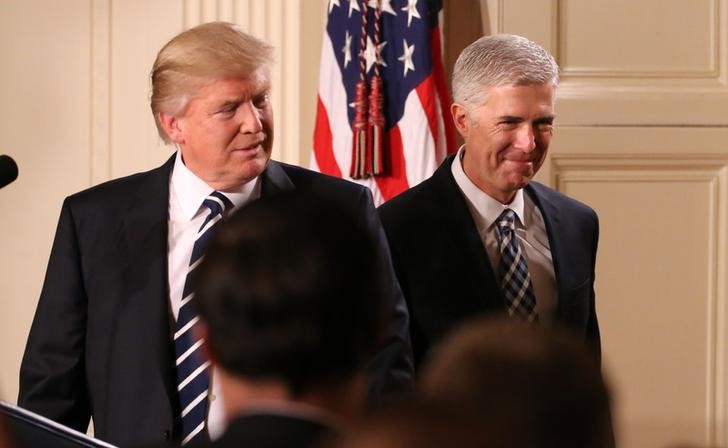Investing.com’s stocks of the week
By Richard Cowan
WASHINGTON (Reuters) - President Donald Trump on Wednesday urged Senate Republicans to "go nuclear" and impose a rule change to force a simple majority vote on confirmation if Democrats block his U.S. Supreme Court nominee, Neil Gorsuch, as Democrats maneuvered for a hard fight.
Gorsuch, a federal appeals court judge from Colorado seen as a conservative intellectual, began holding private meetings with senators, starting with top Senate Republican Mitch McConnell, to drum up support for his nomination a day after Trump picked the 49-year-old for a lifetime job on the country's top court.
Trump's fellow Republicans control the Senate 52-48. Democrats signaled on Wednesday they would set up a procedural hurdle, known as a filibuster, requiring 60 votes, rather than a simple majority, to move toward confirmation of Gorsuch.
The president urged McConnell to change long-standing Senate rules to eliminate the filibuster for Supreme Court nominees, a move dubbed the "nuclear option," if Democrats block Gorsuch.
"We want to have him (Gorsuch) go through an elegant process as opposed to a demeaning process, because they're very demeaning on the other side, and they want to make you look as bad as possible," Trump said, referring to Democrats.
"If we end up with that gridlock, I would say: 'If you can, Mitch, go nuclear,'" Trump said at a White House meeting with conservative advocacy groups.
Supreme Court nominations require Senate confirmation.
If confirmed, Gorsuch would reinstate the Supreme Court's conservative majority, in place for decades until Justice Antonin Scalia's death last Feb. 13. The court's ideological shift could prove pivotal on a range of issues including presidential powers, abortion, the death penalty and transgender, gun and religious rights.
Trump's comments came as Democrats plotted strategy on how to deal with Gorsuch's nomination. They remain furious over McConnell's refusal last year to let the Senate hold confirmation hearings or a vote on Democratic President Barack Obama's nomination of Merrick Garland to succeed Scalia on the court.
Some Democratic senators, arguing that Republicans stole a Supreme Court seat from Obama, announced their opposition to Gorsuch, while others said they were willing to hear him out.
'CHANGE THE NOMINEE'
Senate Democratic leader Chuck Schumer said on the Senate floor that if Gorsuch could not meet the same standard Republicans insisted on for Obama's Supreme Court nominees, at least 60 votes for confirmation, "then the problem lies not with the Senate, but with the nominee."
"The answer should not be to change the rules of the Senate, but to change the nominee to someone who can earn 60 votes. Sixty votes produces a mainstream candidate," Schumer added.
To get those 60 votes, Republicans hope to lure eight Democrats up for re-election in 2018 in Republican-leaning states or states that voted for Trump last November.
Those include Democrats from Indiana, North Dakota, West Virginia, Missouri, Michigan, Montana and Wisconsin as well as closely divided Maine.
Senator Sherrod Brown, a Democrat from Republican-leaning Ohio, already announced he would vote against Gorsuch.
Senator Tammy Baldwin of Wisconsin said she would review Gorsuch's record but was "deeply troubled" over his stances against disabled students, workers and women's reproductive healthcare.
Senator Jon Tester of Montana said in an interview he wanted to review Gorscuch's record on women's rights and other issues, adding the judge's stance on end-of-life issues "distresses me."
Gorsuch is known for siding with the Christian owners of a company that challenged federal requirements that businesses provide insurance coverage for women's birth control and for writing against euthanasia and assisted suicide.
The influential, deep-pocketed Americans for Prosperity is promising a vigorous effort to help Gorsuch get confirmed and is using its network of wealthy contributors to build support, especially in battleground states.
The organization is led by multi-billionaire brothers Charles and David Koch. It has been ramping up its political campaign donations in support of Republican candidates for the Senate and other offices.
Schumer said that while Trump campaigned as someone who would "be for the working man and woman," he now had chosen a Supreme Court nominee who "sides with CEOs over citizens."
"Unfortunately, Judge Gorsuch has proven to have a judicial philosophy outside of the mainstream and time and again has subjugated individual rights to those of corporations," said Democratic Senator Kirsten Gillibrand of New York, who came out in opposition to the nomination.
Senator Joe Manchin, a moderate Democrat who met with the nominee on Wednesday, said a Supreme Court nominee should have to win the support of 60 senators but urged fellow Democrats to give Gorsuch a chance. Manchin, whose home state, West Virginia, voted overwhelmingly for Trump, is up for re-election in 2018.
Senate aides said Republicans were hoping the Judiciary Committee could hold hearings and a vote on the nomination by late March, paving the way for confirmation by the full Senate in the first week of April. If that happens, Gorsuch could be on the high court in time to year a major transgender rights case.
